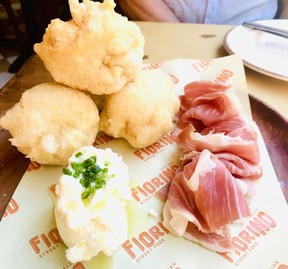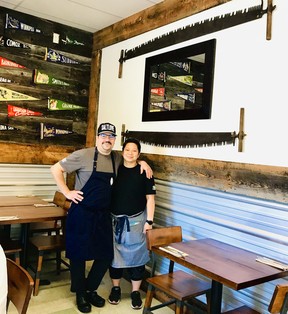Reviews and recommendations are unbiased and products are independently selected. Postmedia may earn an affiliate commission from purchases made through links on this page.
Florentine temptations in Vancouver | Vancouver Sun

Giovanni Mascagni missed the street foods of Florence which he grew up with, so he opened a restaurant.

Article content
Fiorino
Where: 212 East Georgia St., Vancouver
Advertisement 2
Article content
Article content
When: Lunch, aperitivo, dinner, daily.
Info and reservations: 604-568-0905; fiorinovancouver.com
Giovanni Mascagni, or Gio as he’s known, put out a call for two roommates to share a townhouse he had rented. His roomies turned out to be a chef and a guy with business smarts.
Mascagni, who grew up in Florence, Italy, had been nursing a dream of opening a restaurant showcasing Florentine street food. They all got along. The stars aligned.
Mascagni, Mario Ruiz, the chef, and Mitchell Clark, with the business background, opened Fiorino in Chinatown last October on a block already rocking good food and drink — Lao Wai, Blnd Tiger Dumplings, Fat Mao Noodles, Phnom Penh, and Irish Heather.
In Florence, street food culture reached a tipping point a few years ago, and the city banned people from stopping and eating on the busiest tourist streets to ease congestion and litter.
Advertisement 3
Article content
Me, I only slurped gelato when I visited Florence many years ago when Vancouver was still in its gelato infancy.
Mascagni, on the other hand, yearned for schiacciata, a flatbread with a unique texture — like focaccia but thinner, with a crisp exterior and spongy interior — an integral part of Florentine street eats. He tried making it himself, which only intensified his longing for good schiacciata, or “squashed”, describing what’s done to the dough between two proofings.

In 2016, he did a stage with a well-known baker in Florence to learn the secrets to schiacciata and then again in 2019.
“And when it came out nice, that was the moment I thought of opening a restaurant,” he says.
Mascagni had earlier trained as a pilot in Italy and moved to Canada, his mother’s country of origin, to study for a seaplane licence to work as a bush pilot. While at the training school, he worked as a dishwasher and fell in love with the restaurant industry, making his way up to management. In Vancouver, he’s worked at Autostrada, Six Acres, and Portland Craft. He is not bush piloting, but he does own a 1964 Vespa which he drives around “when it works.”
Advertisement 4
Article content
Ruiz was previously a sous chef at the late, great Bishop’s restaurant and Clark worked at Velofix, a North American mobile bike repair company.
The trio completed much of the grunt work renovating Fiorino themselves, including lime washing the walls to resemble the “outside of Tuscan villas,” while slicked in sweat during the heat dome last summer.
“It was a long, tedious process,” he says of the three-stage brushwork with wet limestone and pigment.
When I contacted Mascagni, Fiorino’s GM, he was driving with Florentine friends through Death Valley, enroute from Yosemite National Park, where they’d be hiking, to Las Vegas.
“We always dreamed of doing a road trip to California,” he says.
Fiorino’s namesake is a Florentine coin.
Advertisement 5
Article content
“It was the predominant coin of the known world in the 15th, 16th century,” says Mascagni, a Florentine history buff. “The powerful Medici family created the modern banking system.”
It’s also the name of a Fiat delivery truck first made in 1976.
“They’re used in the tight streets to deliver milk and bread every day in Italy,” he says.
Initially, the owners envisioned Fiorino as a sandwich shop but given the great location they added dinner. At lunch, schiacciata sandwiches prevail — delicious-sounding ones, like the “Michelangelo”, with guanciale, honey, walnut crema, frisée, cherry tomato and parmigiano — along with a few other Florentine dishes such as pastas and fritto misto with confit garlic aioli.
From 3 p.m. to 6 p.m., it’s the Italian happy hour or aperitivo, with share plates to snack on.
Advertisement 6
Article content
The dinner menu features appetizers, mains and dessert. The standout for me is the coccoli e prosciutto ($26). Deep-fried schiacciata dough is served with 18-month aged prosciutto de Parma and whipped stracchino cheese. Oh, so, so good! Like many delicious things, coccoli began as a culinary fumble — dough had been overproofed and couldn’t be used for flatbread. Instead, the cook pinched off balls of the dough, deep-fried them and called them coccoli, or “cuddles”. It’s typically served hot with soft stracchino and prosciutto. I wished to leap up and dance!
The schiacciata bread can also be ordered as a side with olive oil and balsamic vinegar for $8.
I enjoyed a lofty salad of radicchio, frisée, fennel, apple and pine nut vinaigrette ($14), so perky with crunchy and crisp elements. The lamb meatballs ($19) weren’t cut with filler and tasted deliciously of lamb. It came with Tuscan salsa verde made with parsley, not tomatillos, and cilantro as in the Mexican style. Peperoncino gave it a kick.
Advertisement 7
Article content
Housemade potato gnocchi ($28), with a nice al dente bite, was enveloped in wild boar ragu. Really good. A couple of dishes are meant to be shared family style and require pre-ordering. The full eight-ribbed lamb rack and the Florentine porterhouse steak, weighing in at about 35 ounces and dry-aged 45 days, are both meal enough for four. The natural porterhouse is sourced from 63 Acres Beef and both dishes are charged at market price.
For dessert, we shared a slice of pistachio white chocolate semifreddo with raspberry coulis.
The wine list is impressive considering the restaurant’s branding as humble “street food.” Most wines are from small Italian producers growing rare grape varietals. They range from a pét-nat rosé (naturally sparkling) to a bold Barolo and all stops in between. Mascagni is keen on female-operated Donatella Cinelli Colombini wines and its support of women in the winemaking business. Cocktails include a number of riffs on the ever-popular negroni and “Italian” versions of a paloma, which seems to be having a moment, and a mojito.
Advertisement 8
Article content
A sampling of craft beers and interesting digestivi such as grappa and amari round out the drinks.
SIDE DISHES

Chris Whittaker, long the farm-to-table, ecologically minded chef at Forage restaurant at the Listel Hotel, left in 2018 and moved to Blind Bay. It’s off the southwest shore of Shuswap Lake. Having for the first time checked it out, I see its allure.
Whittaker worked for a short time at Quaaout Lodge then — lucky Blind Bay — he opened his own restaurant, Timber, which is open Wednesday to Monday for breakfast, lunch, dinner and brunch on weekends.
He left the harried executive chef life in the city when he and wife Marianne adopted a little boy, now five, from Vietnam. That former life, he says, is not why he became a dad.
Advertisement 9
Article content
I stopped for lunch at Timber, a quick detour off the Trans-Canada Highway, between Chase and Salmon Arm. It takes the same name as the now-closed, casual Canadiana restaurant he also oversaw at the Listel. I had a “big” salad with carrot and miso vinaigrette, showcasing the lovely bounty from local farms.
“We’re surrounded by a farming community and about eight wineries,” he says.
My husband’s Timber burger with locally made brioche bun, lettuce, caramelized onions, cheese, and local beef was juicy-delicious and an unbelievable $11. I stole two big bites of it.
For dinner, you can dine casually — a crispy buttermilk fried chicken thighs in a brioche bun for $14 might fit that bill. Or more serious dining might involve local beef tenderloin with gnocchi, morel mushroom espuma and wilted spinach from a farm called Spotted Moose ($42) or Douglas fir cured coho salmon with roasted radish and carrot, warm potato salad, garden “weeds” and citrus dressing ($38).
Source: vancouversun.com


